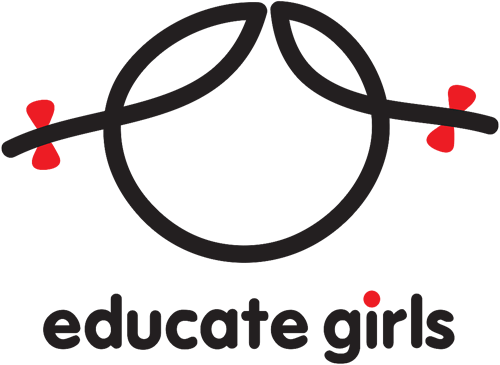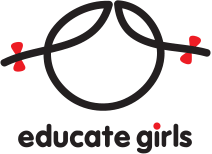When it comes to global challenges, girls face the greatest risks and fight the toughest battles. They have to defend their rights and their futures – making this world a more equal place for everyone. From poverty and violence to discrimination and displacement, girls in every nation experience the global evil of gender inequality. A school is the only best place to exercise their agency, make their voices heard, and access their first leadership opportunities. Not only for females, but education is a vital tool for all humans as it assists an individual to be smarter, learn new things, and improve their skills and economic condition.
To help underserved females overcome the barriers they face in education, many non-profit organizations came to action in several different ways. Educate Girls is also a non-profit working on the ground with the support of many locals to address the issue of barriers to girls’ education and find feasible ways to overcome them. They initiated several activities door-to-door surveys, enrolment campaigns, etc. to pull girls through the lack of quality education. Let us have a look at how grave this issue is and how Educate Girls is scaling their impact on girls’ education.
By Taking Geographical Clustering & Saturation Approach
This approach has contributed a lot to Educate Girls’ impact, mindset and behavior change efforts. Safeena Hussain – the founder of Educate Girls clarifies her goal by saying “we want to create an echo chamber, with everyone from village headmen to government block officers spreading the same message.” Aiming at creating a network of diversified minds for one sole purpose is the strongest and fastest tool to tackle an existing crisis or problem.
This non-profit works in clusters of villages within a district having huge gender gaps. Grouping geographically and saturating homogenous communities with a message enables it to achieve widespread awareness regarding the importance of girls’ education within a specific village, block, or district. Clustering also helps in narrowing the levels of communicating bodies for gaining the government’s support for implementing a solution of helping educate underserved girls. Geographical clustering gives a better understanding of the ground reality to the governing bodies as it is easier for everyone to understand a specific problem within their own culture and the group of people who are similar to them. This helps in searching for solutions feasible to all situations and helps in getting a better outcome.
By Building Sustainable Volunteer & Staff Recruitment Training and Retention System
For any organization working for a change in mindset, it is important to build strong relationships with the local communities so as to stay grounded with them. Educate Girls’ “local agent, local message and local voice” helps the volunteers a lot in building strong relationships with the locals. Experimenting with volunteer recruitment and compensation helped them understand the importance of local agents as drivers of change in communities. Many Team Balika volunteers and staff members in Educate Girls are recruited from the communities they work for. This investment helps them in finding solutions and developing a strong understanding of needs and challenges.
Recruiting locally has its own advantages as it translates well into effective community and engagement efforts, evident in high-enrollment numbers and also in rapidly changing community mindsets. Educate Girls stays in regular communication with all its teams through monthly and annual meetings, phone calls, newsletters, and open houses. This way it is building a team of sustainable volunteers whose local skills will be of much use to the organization and in turn to the persons involved in this issue.
By Enabling Strong Partnerships With All Stakeholders At All Levels
Strong partnerships with government stakeholders facilitate the delivery of the Right to Education Act and Educate Girls’ mission. They have opted for strategic choices for the organizational structure which has made it easier to build strong relationships with the government at all levels. The government sector comprises multitudes of actors, from teachers to block officers to district collectors. The way one defines the staffing model – a cluster, a block, or a district, forms a deliberate mirror image of the government.
Thus, relationship building is a responsibility from across all levels of staff within the organization, from Team Balika to state managers. Educate Girls’ strong government relationships enables it to deliver on its mission of leveraging existing community and government resources to improve education for girls.
By Streamlining Purposeful Data Collection & Its Uses
Streamline data collection helps this non-profit optimize the activities and use of resources in response to the community’s needs. The collected data is valued for accountability and is driven in decision-making. The collected data informs its resource allocations, target hotspots, and engagement activities based on the community’s needs. The senior officials discovered that film screenings for any issue were easier to organize but they only resulted in increased awareness among community members, rather than increased enrolment of girls in schools leading to the neutral impact of girls’ education. As a result, they chose neighborhood meetings to maximize the enrollment of girls in schools in underserved areas.
The purposeful data collection of Educate Girls contributes to the efficient use of financial and human resources devoted to monitoring and evaluation. Furthermore, the collected data is viewed as an ethical practice for avoiding wasted efforts and costs of collection of data that is unnecessary and will not be used. This approach gets better with time as additional digitalization is rolled out.
By Ensuring Catalytic & Flexible Anchor Funding
Catalytic and flexible funding enabled Educate Girls to channel resources to fulfill community needs and support the developing staff and volunteers to scale up achievements in improving enrollment, achievement, and learning outcomes. This strategic and outcomes-based approach is beneficial in managing the finances and healthy relationships with the funding partners. Continuously growing financial support increased the budget from $7 million to $8.5 million over the past 7 years and has enabled the organization to expand multi-folds. This non-profit invests substantially in its field staff and volunteers meaning that around 70% of its costs are devoted to supporting its own people and encouraging them for future challenges.
But they should not stop here and must constantly work hard to maintain and expand the base of its funders who value the outcome-driven approach which is embraced by the organization. It also creates a space to tailor the solutions and programming to context. So, substantial financial support from anchor funders is identified as necessary for growth.
When women are empowered to participate in various processes, they learn to have a greater say in the decisions that affect their lives and their communities, leading to more involved and representative decision-making. This also increases the number of policies and programs that better understand the needs of women and adolescent girls. This initiative will lead to a decrease in gender inequality and will also leave positive impacts on women’s health, well-being, and overall quality of life.
As you know about the problems faced by women in various parts of the world, we hope that you are inspired to take action and make a difference. We all should stand together as when it comes to equal representation of women, we still have a long way to go. By supporting the organizations or non-profits that work for this cause, we can help ensure the quality of life for each underserved girl. The way Educate Girls is sticking to the root of the problems for girls’ education raises a hope that someday girls will get the desired place all over the world.
By working together we can increase the impact of girls’ education. Donate Now!

